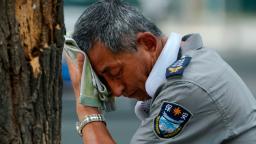
Cnn
–
Climate change that caused a person has already made a more frequent and intense heat waves in the world.
Learning the role of global warming, scientists today carry fingerprints of the climate crisis of every heat wave.
First of all, the climate change managed by people who burn people burning people, in general, global extreme weather is worse, but most of this change are related to heat.
In the United States, the heat kills more Americans than any other weather-related disaster, and this will continue to worsen as it is heated from burning from fossil fuel.
Here’s what will happen to watch on extreme heating in your body, and how to keep it safe.
What happens in your body
Normally, your body is usually used in a certain temperature between 97 and 99 degrees Fahrenheit. When your brain feels a change – or higher – or higher – in the Boston Medical Center, the Emergency Medical Center and Emergency Medical Department Executive Deputy Executive Department of Boston University.
“(Brain) There are a number of different ways that are trying to lower the body. One way is the most common way we think,” said Linden. “The pores are open, body sweat and sweat vaporize, the body cools.”
Lower your body, increases your heart rate by helping the surface of your body helps bring heat and blood to spread and spread your heart rate.
When you are exposed to high temperatures, it becomes difficult to keep up with your body test and peeling. If your surroundings are hot and Humid, sweat is not easily evaporated – according to the Mayo Clinic, further increases your body’s temperature.
“The higher the higher temperature needed for extreme heat,” said Linden.
CDC says high body temperature can damage the brain and other vital organs. They can also cause several heat-related diseases.
Lightly heat-related diseases, including Heat cramps, Linden is most common. Heat cramps can develop in people who do not sweat much during training. Excessive sweating uses the body’s salt and moisture and can generally cause muscle pain or spasms in the abdomen, arm or legs according to CDC.
One Heat in a hurry can also develop. CDC says that a skin irritation caused by very sweating in hot and humid weather and most common in young children. Usually a red group of pimples or blisters tends to be in places, including neck, upper chest or elbow shrinks.
If your body exceeds the ability to cool down, you can develop what is known heat exhaustion.
“If you see extreme sweating in this situation, because your body will really go with this additional heat and you can feel the dizzy, often faded and clangy and pulse often.”
“It’s really the last attempt to cool yourself before you really go back.”
A heat stroke It is the most serious heat-related disease and can cause death if they are not cleaned.
“Your body temperature is above 104 to 105 degrees, and this is the mechanisms to fail,” Linden said.
Warning signs, red and dry skin, rapid pulse, headache, dizziness, dizziness, dizziness or consciousness loss or consciousness loss or consciousness loss or consciousness loss or consciousness loss or consciousness.
Linden, the symptoms of the heat stroke are confusion and encouragement.
“And when someone is in the heat and mixes and mixed, otherwise you need to call 911 to 911 or get out of heat.”
People with chronic medical conditions, as well as children are higher risk for severe heat-related diseases.
People with elderly and chronic medical conditions can worsen temperature changes and heat effects and worsen heat effects, CDC said.
“Very young people are less likely to recognize heat-related disease and are less likely to get out of heat,” said Linden.
Student-athletes and pets are also at higher risk.
“In this weather conditions, you should never leave a child or a pet at any time,” Linden said.
When your community is excessive heat, there are a few things you can do to keep yourself and others safe.
First, pay attention to the symptoms of heat depletion or other diseases. “If someone feels light-headed, dizziness, nausea or headaches, this is the time to act immediately,” he said. “This means to produce them from heat and to a cool environment.”
It can help keep them cool by putting the symptoms and put water on someone who gives fluids. If someone lost consciousness or nausea or vomiting, call 911.
“If you see anyone with any confusion, this is an immediate red flag,” said Linden.
When it was hot outside, try to avoid open activities – especially for Linden, 11 am from 11 pm. Walk outside, wear lightweight clothes, cover your head and drink plenty of liquid.
Do not wait until the water is thirsty to drink – can be a sign of dehydration. Linden recommends drinking at least one glass of water – or more – an hour.
“If you start to feel light-headed, dizzy, sweating, fast pulse, go out of the heat immediately,” Linden said.
Ready, try to find the places in your air conditioner or area. It can also help you spend several hours in the mall or public library.
When you are at home, fans can help, but do not trust them as your cooling way – they will not help prevent heat-related diseases.
“If you have a fan, are it helpful? No, if you have a fan, fans can be useful,” he said. “Supporters are not stupid.”
Finally, your neighbors, your parents and friends are elderly people who are especially living or being isolated or areolated or isolated.




